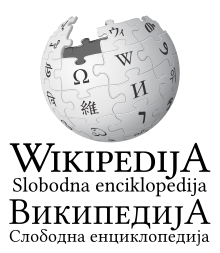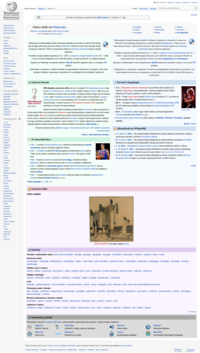Serbo-Croatian Wikipedia
 | |
 Serbo-Croatian Wikipedia in June 2023 | |
Type of site | Internet encyclopedia project |
|---|---|
| Available in | Serbo-Croatian |
| Owner | Wikimedia Foundation |
| URL | sh |
| Commercial | No |
| Registration | Optional |
| Launched | 16 January 2002 |
Content license | Creative Commons Attribution/ Share-Alike 4.0 (most text also dual-licensed under GFDL) Media licensing varies |
The Serbo-Croatian Wikipedia (Serbo-Croatian: Wikipedija na srpskohrvatskom jeziku, Википедија на српскохрватском језику) is the Serbo-Croatian language version of Wikipedia, the free encyclopedia. It was started on 16 January 2002, preceding Wikipedia versions in the different standardised varieties of the language, namely Bosnian, Croatian, and Serbian. It is written in the Latin script with a converter to Cyrillic. It currently has 496 active users, 8 administrators, and 460,170 articles, comprising a total of 42.3 million edits.
History

The Serbo-Croatian Wikipedia was originally launched on 16 January 2002 at the address sh.wikipedia.com, and moved to its current address sh.wikipedia.org on 23 December 2002. On 12 December 2002, a separate Bosnian Wikipedia was founded, later including articles from the original Serbo-Croatian Wikipedia. On 16 February 2003, separate Croatian and Serbian Wikipedias were launched. As of 2025[update], no Montenegrin Wikipedia exists; an experimental Crnogorska Enciklopedija existed from 2006 to 2008, but proposals for a Montenegrin Wikipedia have been rejected four times by Wikipedia's language committee.[1]
The Serbo-Croatian Wikipedia was locked in February 2005 due to inactivity, but was re-opened in May 2005.[2] Some editors were opposed, such as User:Caesarion, who acknowledged that Serbo-Croatian is mutually intelligible with Bosnian, Croatian and Serbian, '[b]ut the wounds of the nineties Balkan wars are all too fresh to... let Serbs, Croats and Bosniaks cooperate on one Wikipedia. We must use separate Wikipedias just to keep the whole project peaceful.'[1] However, the argument to re-open it was successful due to efforts driven by editors such as User:Pokrajac, who stated: 'So, this Wikipedia (if you open it) will be absolutely NPOV, liberal and antinationalist. Many liberal and antinationalist people said that they are talking Serbo-Croatian despite Balkan war(s).'[1] Richard Rogers (2015) concluded that the separate Wikipedias for Bosnian, Croatian and Serbian were created as 'solutions to the burden of collaboration after the Balkan wars'.[1] He further analysed how each of these Wikipedias as well as the Dutch and English Wikipedias created or translated an entry on the Srebrenica massacre of July 1995, noting how users changed the titles of that article in each Wikipedia and discussed which title was most fitting. Rogers found that in this process, the Serbo-Croatian Wikipedia was considered neutral and unifying, attempting to find the best balance between different standpoints and 'softening both the Bosnian and Serbian points of view'. Like most Wikipedias after much discussion over the years, Serbo-Croatian Wikipedia named the event 'Srebrenica massacre', while Bosnian and Croatian Wikipedia named it 'Srebrenica genocide', and Dutch Wikipedia 'Fall of Srebrenica'.[1] In 2021 however, the article was renamed 'Srebrenica genocide'.
In September 2014, the Serbo-Croatian Wikipedia was the second largest South Slavic Wikipedia by the number of articles, after the Serbian Wikipedia. In 2017, it was the first South Slavic version and fourth overall Slavic version at 0.44 million articles (7.6% of all articles in Slavophone Wikipedias, behind Russian at 1.4 million, Polish at 1.24 million, and Ukrainian at 0.74 million), ahead of Serbian at 0.37 million (25% smaller).[3] As of January 2025, the Serbo-Croatian Wikipedia is the second largest South Slavic version and the 32nd largest Wikipedia in the world.[4] A substantial portion of Serbo-Croatian Wikipedia articles are geography, astronomy, and chemistry-related stubs created by Wikipedia bots between 2013 and 2015. By 2023, bots contributed to 41% of the total edits and created 55% of the articles.[5]
See also
References
- ^ a b c d e Rogers, Richard (2015). "Wikipedia as Cultural Reference". Digital Methods. MIT Press. pp. 166–177. ISBN 9780262528245. Retrieved 22 June 2021.
- ^ Requests for new languages/Wikipedia Serbo-Croatian. May 2005 – via Meta-Wiki.
- ^ Kamusella, Tomasz (2021). Politics and the Slavic Languages. Abingdon: Routledge. pp. 95–96. ISBN 9781000395990. Retrieved 22 June 2021.
- ^ "List of Wikipedias". Wikipedia. Wikimedia Foundation. Retrieved 19 March 2022.
- ^ Alshahrani, Saied; Alshahrani, Norah; Matthews, Jeanna (2023). "DEPTH+: An Enhanced Depth Metric for Wikipedia Corpora Quality". ACL Anthology. Association for Computational Linguistics: 175–189. doi:10.18653/v1/2023.trustnlp-1.16.
